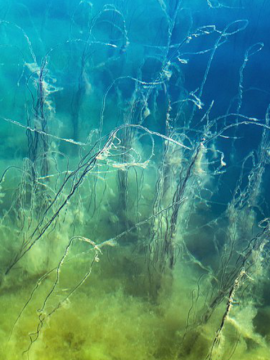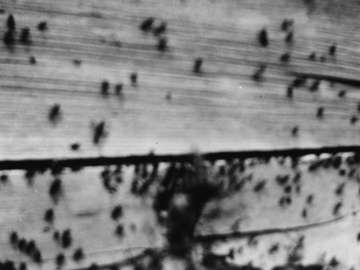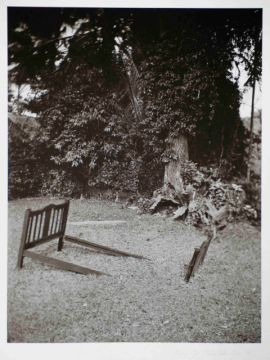The Knot
Rose Michael
Leisl wakes. Finds herself standing in the garden in the dead of night – an undead night! She finds herself: standing. Night, but. It is: insanely noisy. There seem, bizarrely, more animals awake now than in the short daylight hours. Is it? Bizarre? A bazaar! Winter weather surprisingly mild. The soft rain, warm. Last night’s storm surge has settled. Leisl waits in a darkness that goes on for so long she has no sense how close day might be. How far away. There is something out there, she thinks, that has drawn her from sleep. Thinks. Hears: here. Drawn her from her bed, and the white house.
More than one – some things.
Slowly, eyes adjust.
There is a … sound? That isn’t: quite. A … smell? Some sense of hers imagines fish. Leisl’s heard of aquatic animals picked up in tornado waterspouts, raining down. Hardly believed in that but–––
SPLAT!
Runs! Instinct grabs a sharpened shovel from the shed. She’d had snakes in mind, but it’s another reptilian thing that her on the defensive now. Now! On the attack. Just as poisonous – if not so dangerous. Because Leisl can see them – it! Now: at her foot. Thick and fat.
Evil eyes. Red-brown ridges running down its warty snout like eye-snot. Slitted, horizontal pupils fix on her. Who refuses to be mesmerised by golden irises. Not: thinking of fairy tale lips – she self-contradicts. Unconsciously puckering her own. Staring back at
the night intruder. Whose association with fertility comes from the way they do: after floods. Popping up – plopping down! – as longed-for rains replenish barren lands.
So many stories across so many countries of frogs spewing forth water. Giving back what was stolen.
But this is the opposite of that. Leisl slams the spade. The flat blade makes a sickening
sound.
And then the lack of that – as impact passes through the splayed form to connect her effort with the earth.
Gingerly she lifts her weapon. Regards, unblinkingly, the mess she’s made. A winking translucent eyelid: the nictitating membrane that aids sight underwater. Her skin would crawl right off if that transparent screen slid over this bulging orb
that oscillates between them.
It looks like – not like! – a premmie baby. Skinny limbs: akimbo. Distended tummy. Swimming in viscous.
Drowning in the same.
Is her hand on the spade shaking? The spade: shakes. Leisl cannot believe how hard she had to hit it. And how hard she did. Does. Again. Is amazed – awed! – at how little damage she seems to have done. Has done. Lifts the spade, angling it better for decapitation, when
more toads rain down.
Pop.
Plop.
Hop.
The giant neotropical pests were on the move. Voracious feeders: out-competing native species. One of the only amphibians to eat dead matter – as well as living. They disn’t discriminate. Leisl and the night visitor boggle each other.
Introduced to control the spread of scarab beetles, it’s their poison that’s the problem. Deadly glands provide the best defence against potential predators. Not all of whom fall victim though. Some species are adapting: local river rats learning how to rip out hearts and livers with deadly precision. Soon adept at removing toxic gallbladders. Picking the biggest, most dangerous, highly toxic loads. Their monstrous size makes surgery
easy.
Easier.
Wiping a wet mouth on the back of her hand, Leisl ducks and dodges pops and drops. Straddles poisonous puddles as though her visitor might bounce back. But it – she – doesn’t. They die:
deflated.
There is a native rodent that actually prefers the taste of toad.
Leisl licks her lips. A prolific breeder, spawning thousands of eggs, their tadpoles were as toxic as their mother’s skin. But saltwater crocodiles – and some snakes – had in-built inoculation because relatives of the toad were widespread where they’d come from. Valuable genetic inheritance that had never before been put to
the test.
Even birds were getting in on the act. Crows aren’t fussy and will go a bit of toad on the road. Most kites flew on just fine after eating them – warts and all. Kookas and maggies were ripping tongues right out of ribbi-ing mouths!
Leisl raises her blade, the spade. Slices again and again and again. Surprising herself. Leaning her whole weight on the shovel so feet lift off the ground to finish the job.
Again.
The most humane way, they say, was that practiced twenty years ago. Freezing.
But there is not enough room in her freezer for all these ... this …
knot.
That’s the collective noun. A not! Of cane toads.
Chips in their brains have confirmed that all feeling is gone before their feet begin to freeze. It is difficult to measure pain and distress by observation alone: their heart rates can be tricky to detect; respiration occurs through the skin as well as lungs. Scientists look for the loss of righting reflex. When they can no longer turn themselves over, if placed on their back. Where there is no sign of withdrawal, if the skin between their toes is squeezed …
Leisl splices and dices. Eyes popping.
Any evidence of life – of pain – and the procedure must be repeated.
She
slides the garden implement like a fish slice under the dead body. Dead bodies. Like it is, they are, fish. Carries the fishy thing to the very bottom of the garden where she hopes it will not leach.
One down.
But there were so many ones.
The next will get a hammer between the eyes, Leisl decides. She had better take care not to let poison from their paranoidal gland spurt up into her own. Returns from the shed with a hammer in her hands – feeling at once like she is overreacting, and not taking herself seriously enough. The head of the hammer is too small. Its weight too little. She goes back inside. Rummages among old camping things until she finally finds a mallet. Perfect for knocking tent pegs or cane toad heads in.
She will not make a hash of it – she will make a hash of it! Kill the invaders and bury their bodies before any one has any idea she is as monstrous as
.
plop
.
chop
.
flop
.
them.
The science inspiring the piece:
'Cane toads are on the menu for more native animals than we might think', The ABC
'Cane Toad Hunting: Why Cruelty to Animals Is Never the Answer', Peta
Listen to Rose read the piece here, with music by Peter Daniel


